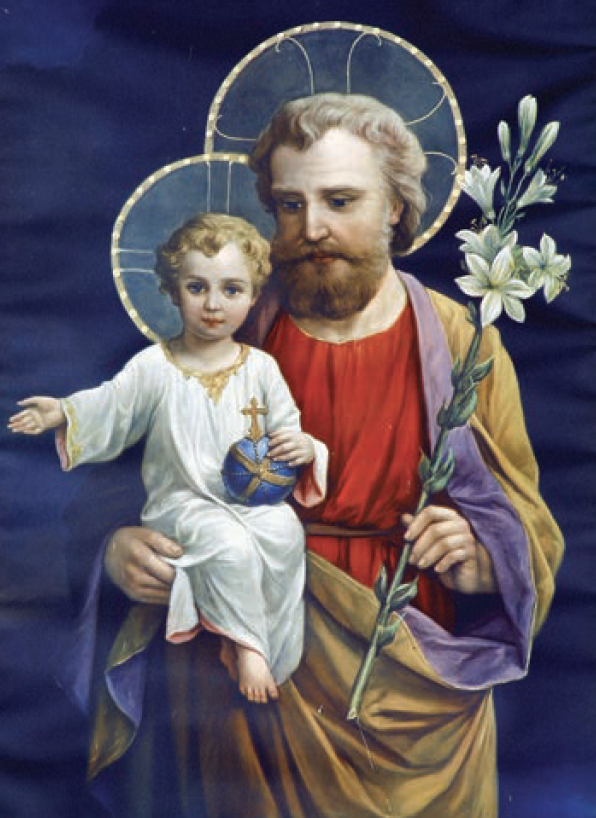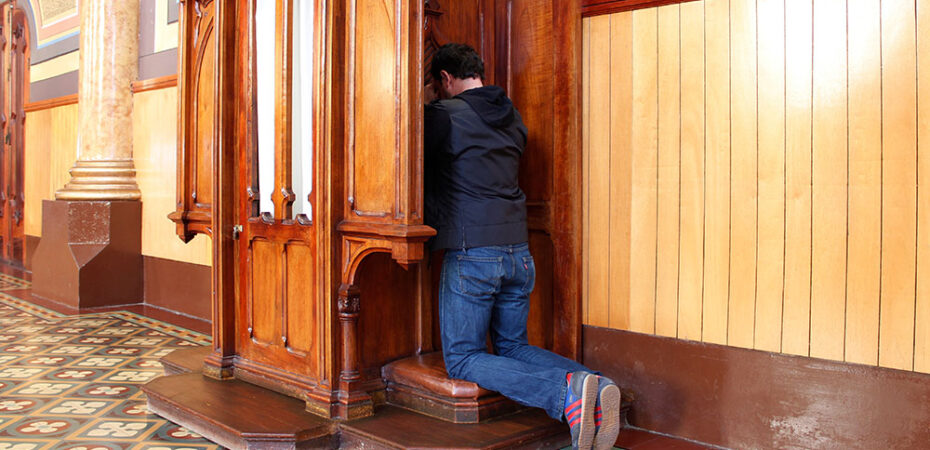Spiritual Fatherhood, Loneliness and the Structure of the Church
Rediscover the role of a spiritual father and pray for the grace to be one
Anthony Lilles 1
An aspect of diaconal formation that requires attention is spiritual fatherhood. Oftentimes deacons are thrust into this role because of their age or life experience. If anyone has wounds of resentment toward father figures, the deacon will likely receive the brunt of it. Sometimes, he, too, suffers such misery in his own struggles with authority. This is the crisis of fatherhood. The whole mystery of loneliness in the structure of the Church is affected. If we are to address this crisis, it is time to rediscover the role of a spiritual father and to pray for the grace to be one.
The crisis results from a tyranny of media technology that has the purpose of nudging us into competitive self-interest. Whether driven by greed or fear, all of us together become bogged down in things too small for the heart. This force at work in broader society is also at work in the Church. Increasingly, religious professionals tend to speak of the Church as a business that provides religious services as if these were self-interested commercial goods.
Instead of spiritual fathers safeguarding the sacred, how often do the ordained complain of being workers at a drive-through? The despairing feel like custodians of a failed institution entrusted with closing up shop with as little fuss as possible. The naive try the next new program as if it were a new drug. Almost everyone is sucked up into the number games. Unspoken pragmatism weighs maximum religious products efficiently delivered to the maximum number of customers for the maximum profit per parish staff. When these considerations drive one’s sense of identity, myths of progressivism, technocracy and activism have eclipsed apostolic fruitfulness. One spiritual father called this combination of myths “Catholic Church Incorporated.”

Jesuit Father Raymond Gawronski began to use this in homilies in his final years. Frustrated with over-reliance on new programs, he did not believe that these actually address the Church’s developing problems. Each program had its own magical jargon and techniques rooted in new applications of psychological or sociological theory. Over the years, though the programs changed, the problems remained. He did not suffer fools and identified as heretical the effort to replace with technique what only genuine love can do. In this, he was acting as a spiritual father.
Spiritual fathers suffer to see things as they are. They tend to be pessimistic about situations. Father Benedict Groeschel, the founder of the Franciscan Friars of Renewal, once told me that it was better to be a pessimist than an optimist. Whereas optimists are constantly disappointed by things going wrong, a pessimist is always surprised at what goes right. Yet, seeing things as they are is not about being an optimist or pessimist. It is about having the fortitude to accept a state of affairs in the face of disenchantment and continue to have hope. Spiritual fathers need this fortitude.
New programs are spellbinding because they actually have the power to get results. Whether a piece of organizational or psychological technology, they offer real power. The conventional wisdom is that such technological power is morally neutral and that it all depends on how it is used. This, however, is false. New program technologies as the products “of” and “for” human agency always have a moral meaning, good or evil. Psycho-socio technology is designed for measurable results whose alignment with immeasurable sacred truths should not too readily be presumed. Power at the expense of spiritual freedom, the heresy of Catholic Church Incorporated, is expressed in over-reliance on programmatic technology, an intoxication with human power over and against the freedom we need for God and neighbor.
Pursuit of Holiness
A good father does not reject new plans out of hand, but he is wise to the hands that developed them. Not all commercial interest is altruistic. He discerns whether pursuing a course of action can be done in a way that promotes holiness — that is, the freedom to love. Measuring a new undertaking in this way is a sobering exercise. One must look beyond bells and whistles to the heart. Yet this healthy suspicion over the work of human hands is vital to the flourishing of the Church.
Good programs do not make good parishes, good spiritual fathers do. The reason for this is that faith only flourishes to the degree that parishes are places of grace-filled encounters with the love of the Father revealed by Christ. Faith is fruitful in proportion to a community’s freedom to live by God’s love. Spiritual fathers, in their service to freedom, have a particular responsibility to promote such fruitfulness. Only such a paternal love can protect the freedom to love for the sake of God against the enticements of power and efficiency.
The love of the Holy Trinity shines through the many relationships that spiritual fatherhood has the duty to safeguard. We know God because someone else has loved us enough to preach him to us and invited us into a community of holy friendships around the Lord. This includes parents, catechists and neighbors. It can even include strangers and enemies. It suffers the need for forgiveness and sometimes rejoices in reconciliation. It can also include the secret power of those hidden relationships of sacrificial intercession offered by countless unknown contemplatives. In a very public way, it includes the ministry of bishops, priests and deacons. When someone in these ministries becomes a good spiritual father, he is an irreplaceable source of hope precisely because his love keeps good order in the body.
Catholic Church Incorporated is directly opposed to spiritual fatherhood precisely because it attempts to replace fatherhood with a programmatic and technological egalitarianism. When over-reliance on programs and technology goes unchecked, it undermines all legitimate ecclesiastical authority. Rather than faithfully handing on what we have received, we hand on what is merely expeditious and fashionable at the moment.
Spiritual fathers gently assert their role against this tendency and patiently refer the faithful back to the holiness of Christ. Their love liberates the faithful from being cogs in the wheel for the success of some new social experiment in the name of the Church. They do this by entering into the hearts of those entrusted to them, blessing them and listening them into existence.
Listening Presence
The presence of a spiritual father is above all a listening presence. When invited, a spiritual father enters into the heart of another to share his plight and reaffirm his dignity. Each member of the faithful bears a secret sorrow. Unless someone dares to enter a heart to help carry the pain, the person feels alienated. So a spiritual father carefully enters and does so to bless with his presence and the truth. As he attends to heartache, he discovers the beautiful things God is accomplishing deep within. He has a special gift of naming these and helping another see these wonders. This blessing imparts a certain confidence and strength even in the most severe trials. If he does this task well, a good spiritual father can “listen a soul into existence,” to use a phrase discussed by Catherine de Hueck Doherty, co-founder of Madonna House.
If someone were to ask how to form a man for such a role, it is a matter of entering into the right kind of silence. Spiritual fatherhood is born of the sacred silence known as contemplative prayer. In addition to liturgical prayer and vocal prayers such as the Rosary, this prayer opens to an intimate conversation with the Lord. The Rosary can incline to this conversation. Good liturgy is the source and summit of such prayer. But in the intimacy of this prayer, the Word of the Father speaks in silence as explained by Cardinal Robert Sarah in “Power of Silence” (Ignatius Press, $18.95).
A spiritual father learns this language by baptizing his intellect, imagination, memory, affections, intuition and will in stillness before the presence of the Lord. What he confronts in this stillness is not only the noise of the world, but his own noise. His task is to surrender this noise into the silences that God speaks. These silences are not empty voids, but filled with meaning, life and love. As he surrenders the noise, he discovers new capacities to listen in his own solitude, in the Scriptures, before the Blessed Sacrament and in the heart of another.
Encounter in the Noise
It is not enough to fight off interior noise as if it were a distraction. A spiritual father learns to search for God in the noise. This is a quest of faith. In the light of God’s presence, a soul begins to discover that interior noise flows from broken memories and inadequacies. These are not obstacles to prayer but places of encounter. Christ, who emptied himself in humility, prefers to wait for us there. Love alone finds him. This encounter with the Lord in his weakness allows a spiritual father to surrender the noise of his soul back to God. Now a confidence takes shape from which others can draw.
How do we make space for this kind of fatherhood in the face of Catholic Church Incorporated? Catholic Church Incorporated is not the same as the visible Church. The true visible structure of the Church is ordered toward the building up of the Mystical Body, a sacrificial mystery. What is visible is ordered to the invisible, the Church militant to the Church triumphant, communion to mission. This structure puts freedom to love before power and does not suffer abuses of power but for redemptive purposes. Only here can discerning liability, raising money and media outreach be activities through which the Spirit works. To the extent that those who engage these activities do so as disciples following their crucified God, they realize this freedom. With a confident view of the visible structure of the Church, a spiritual father helps everyone remember who they are and their ultimate purpose in the visible bonds of the Mystical Body.
Loneliness
The heresy of Catholic Church Incorporated is to attempt to deal with loneliness in the Church without the Cross. Surmounting the sacredness of the structure of the Church, a kind of commercial mentality replaces a spirit of reverence. This is tempting because the sacred opens to a certain divine solitude that we experience as loneliness. All loneliness is painful — and unless we find a way to offer Christ this pain, it destroys. It is in a certain way the deepest wound of all.
Yet loneliness can also be an opportunity. Indeed, there is something in it that touches our very image and likeness to God. Learning how to suffer loneliness in faith opens deep capacities for freedom. This means joining our loneliness to the loneliness of Christ. No one learns to do this on his own. We need spiritual fathers to teach us the wisdom of the Cross.
Father Gawronski fulfilled his mission as a spiritual father. Diagnosed with cancer after decades of ministry dedicated to priestly formation and the contemplative life, he gave his answer to Catholic Church Incorporated in his last Easter Vigil in a small chapel at St. Patrick’s Seminary. Faith, he explained, has three syllables: life, death and resurrection. Death is not the end of our faith. Death we pass through on the way to new life in Christ. As a good spiritual father, he died pointing to this last syllable of faith, a syllable no program can grasp or technology can achieve, the very substance of our hope.
Spiritual fatherhood is born in silence before Christ crucified. His life flows in that silence. In silence before the Bread of Life, the empty ache of loneliness and all the other spiritual wounds a man bears become silences that hold the Word, chalices for his blood. Deacons who minister this cup draw close to its secret. The secret is that the Word dwells in such silences to give peace and freedom. When a soul suffers these silences with God, then the intoxication of noise loses its hold. The whole visible structure of the Church is built around this sacred place and all of her activities flow from and enter into it. This hope is what spiritual fathers protect and, by laying down his life, help others find.
ANTHONY LILLES, Ph.D., is a professor of spiritual theology at St. Patrick’s Seminary in Menlo Park, California. He has also prepared men for service in the permanent diaconate since 1994 in both spiritual and intellectual formation. Married and the father of three young adults, he is co-founder of the Avila Institute and the High Calling Program. His podcasts are available at DiscerningHearts.com, and he blogs at SpiritualDirection.com.
…………………………………………………………………………………………………………………………………………………….
St. Joseph’s Example

In an interview with Pope Francis published in L’Osservatore Romano on Jan. 13, 2022, the pope noted, “There is a great urgency, in this historical moment, for meaningful relationships that we could define as spiritual fatherhood.”
The pope distinguished between a “psychological or therapeutic” program and said that a “spiritual relationship is one of those relationships that we have to rediscover with renewed effort.”
He added: “Christian faith is not something that can be learned from books or by simple reasoning. Instead, it is an existential journey that passes through our relationships. Our experience of faith thus always arises from somebody’s witness.”
…………………………………………………………………………………………………………………………………………………….






Comments are closed.